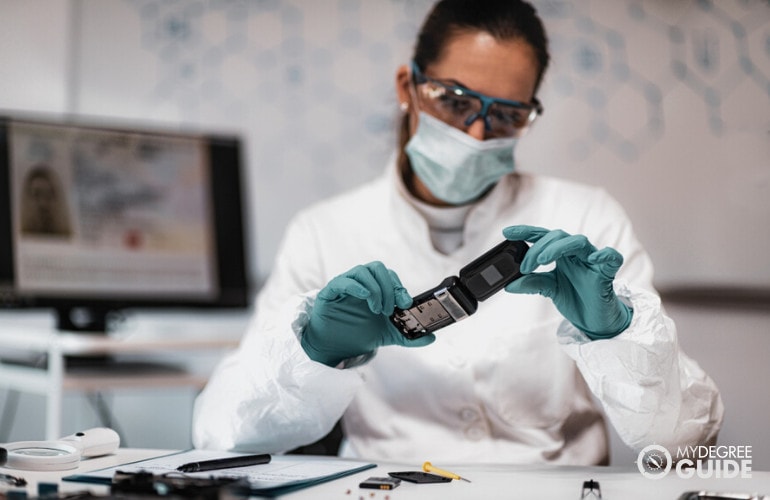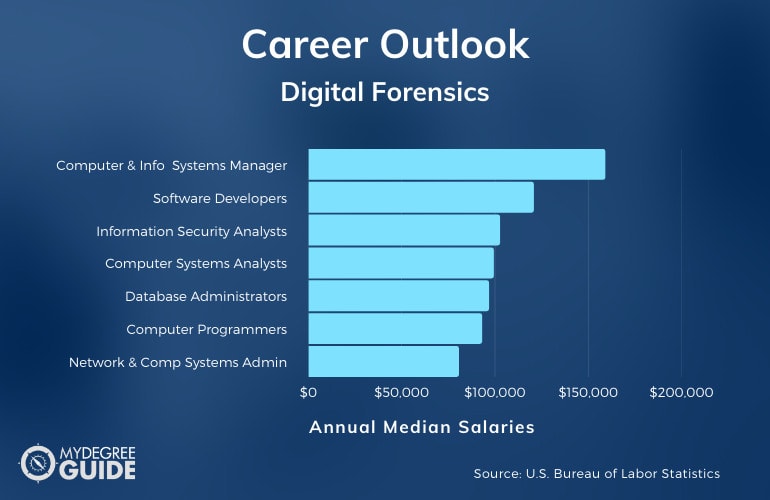An online digital forensics degree tends to deal with applying technical and analytical skills to recover data or analyze digital evidence. Cybercrimes are at an all-time high, so there is a demand for digital forensics experts.

A digital forensics major can help you develop the necessary skills to spot security breaches, gather electronic evidence, and investigate compliance issues, financial fraud, and criminal activities.
Editorial Listing ShortCode:
Earning a digital forensics degree can help you qualify for a number of career paths in this growing field, depending on your interests and area of concentration.
Universities Offering Online Bachelor in Digital Forensics Degree Program
Methodology: The following school list is in alphabetical order. To be included, a college or university must be regionally accredited and offer degree programs online or in a hybrid format.
American InterContinental University
American InterContinental University offers a Bachelor of Science in Information Technology with a concentration in Digital Investigations. The program requires the completion of 180 credits. Course options include Introduction to Computer and Network Hardware, Fundamentals of Programming and Logic, Network Infrastructure Basics, and more.
American InterContinental University is accredited by the Higher Learning Commission.
Bellevue University
Bellevue University offers a Bachelor of Science in Cybersecurity. The degree is available both fully online and fully on campus. Students taking online classes can set their own schedules. Each class has no more than 24 students in it. Bellevue is an open enrollment university that provides multiple start dates throughout the year.
Bellevue University is accredited by the Higher Learning Commission.
California Baptist University
California Baptist University offers an online program for a Bachelor of Science in Cybersecurity. Course options include Introduction to Computer Programming C++, Ethics and Legal Issues in Information Technology, Computer and Network Security, Computer Forensics, and more. The program culminates with a capstone course.
California Baptist University is accredited by the Western Association of Schools and Colleges Senior College and University Commission.
California University of Pennsylvania
California University of Pennsylvania offers a Bachelor of Science in Criminal Justice with a concentration in Cyber Forensics. The curriculum teaches skills such as how to trace emails and recover deleted information. The program gives students opportunities to earn professional certifications from CompTIA: the IT Industry Association.
California University of Pennsylvania is accredited by the Middle States Commission on Higher Education.
Champlain College
Champlain College offers a Bachelor’s in Computer Forensics and Digital Investigations that can be earned 100% online. Students in the program are given open access to their coursework all day, every day. Champlain’s program has been recognized by both the U.S. National Security Agency and the Department of Homeland Security.
Champlain College is accredited by the New England Commission of Higher Education.
DeVry University
DeVry University offers a Bachelor’s in Computer Information Systems with a specialization in Computer Forensics. The degree can be earned in online or hybrid formats. The program can potentially be finished in less than 3 years if classes are taken full-time and year-round.
DeVry University is accredited by the Higher Learning Commission.
East Coast Polytechnic Institute University
East Coast Polytechnic Institute University offers a Bachelor of Science in Criminal Justice with a concentration in Digital Forensics. The degree can be earned 100% online. Coursework includes Criminal Procedure, Ethics in Criminal Justice, Crime Scene Management, Cybercrime Investigation, Law Enforcement Operations, Introduction to Terrorism, and more.
ECPI University is accredited by the Southern Association of Colleges and Schools Commission on Colleges.
National University
National University offers a Bachelor of Science in Cybersecurity. Students can choose a concentration in either Network Defense or Digital Forensics. Classes are 4 weeks long, and students can start at any time of the year. Most students can finish the program in less than 4 years.
National University is accredited by the WASC Senior College and University Commission.
Norwich University
Norwich University’s Bachelor of Science in Cybersecurity is available 100% online. Students can choose a concentration in either Computer Forensics and Vulnerability Management or Information Warfare and Security Management. They can also customize their studies through a wide range of elective options. Multiple start dates are available each year.
Norwich University is accredited by the New England Commission of Higher Education.
Pace University
Pace University offers an online program for a BS in Professional Technology Studies with a concentration in Computer Forensics. Coursework includes Crime and Public Policy, Mobile Device Forensics, Terrorism and Society, Global Networking Technology, Computer Forensics, Cyber Law, and more.
Pace University is accredited by the Middle States Commission on Higher Education.
Regent University
Regent University offers a BS in Cyber and Digital Forensics that can be earned online. Students in the program can receive faculty mentorship. Regent’s curriculum teaches from a Biblical worldview. Courses include Operating System Forensics, Network and Telecommunication Concepts, Malware Forensics, Introduction to Programming, Network Defense and Security, and more.
Regent University is accredited by the Southern Association of Colleges and Schools Commission on Colleges.
Regis University
Regis University offers a Bachelor of Science in Cybersecurity. The program consists of online courses that are 8 weeks long. It can help prepare students for careers as cybersecurity specialists, digital forensic analysts, or cryptographers. Prospective students can apply at any time by simply providing their transcripts, a resume, and an essay.
Regis University is accredited by the Higher Learning Commission.
Robert Morris University
Robert Morris University offers a BS in Cybersecurity that can be earned on campus and online. The curriculum emphasizes hands-on experience and interdisciplinary learning. Classes are taught by expert faculty, and students have opportunities to participate in internships. In the past, graduates have had a 92% placement rate in jobs or graduate school.
Robert Morris University is accredited by the Middle States Commission on Higher Education.
Stevenson University
Stevenson University offers an online program for a Bachelor of Science in Cybersecurity and Digital Forensics. The program is designed to be convenient for working adults while still providing personalized attention. Coursework includes Incident Response and Investigation, Advanced Windows Server Architecture and Administration, and Forensic Evidence Collection Tools and Techniques.
Stevenson University is accredited by the Middle States Commission on Higher Education.
Strayer University
Strayer University offers a BS in Criminal Justice with a concentration in Computer Forensics. The program consists of forty, 11 week courses. The curriculum includes Network Server Administration, Networking Security Fundamentals, Computer Forensic Technology, Information Technology in Criminal Justice, and more.
Strayer University is accredited by the Middle States Commission on Higher Education.
University of Advancing Technology
The University of Advancing Technology offers a Bachelor’s in Technology Forensics that can help students learn how to prevent and investigate digital data crimes. The curriculum covers how to recover deleted or encrypted information, analyze malicious codes, handle evidence correctly, and more. The program includes an internship.
UAT is accredited by the Higher Learning Commission.
University of Arizona
The University of Arizona offers a Bachelor of Applied Science in Cyber Operations with an emphasis in Defense and Forensics. Courses are available online and at multiple campus locations. The curriculum provides studies in cyber law, networking, basic programming, and malware reverse engineering and aims to help students develop general critical thinking skills.
The University of Arizona is accredited by the Higher Learning Commission.
University of Maryland Global Campus
The University of Maryland Global Campus offers a Bachelor’s in Cybersecurity Technology. All courses are available online, and select courses are available in a hybrid format. Students can transfer in up to 90 qualifying credits. Coursework includes Fundamentals of Computer Troubleshooting, Ethical Hacking, Cloud Technologies, and more.
University of Maryland Global Campus is accredited by the Middle States Commission on Higher Education.
Utica University
Utica University offers a Bachelor of Science in Cybersecurity. There are six start dates every year. Available specializations include Cyber Operations, Cybercrime and Fraud Investigation, Network Forensics and Incident Response, and Information Assurance. Students are often given the opportunity to become CipherTrace Certified Examiners.
Utica University is accredited by the Middle States Commission on Higher Education.
Western Governors University
Western Governors University offers an online program for a Bachelor of Science in Cybersecurity and Information Assurance. Students can also pursue 14 different professional certifications. Courses start every month and include Legal Issues in Information Security, Cyber Defense and Countermeasures, Emerging Technologies in Cybersecurity, and more.
Western Governors University is accredited by the Northwest Commission on Colleges and Universities.
Online Digital Forensics Degrees

Most positions in the digital forensics field require a minimum of a bachelor’s degree in the field. There are a number of accredited institutions that offer this course in person and online.
Some of the topics that you may study as you pursue your digital forensics degree include:
- Intrusion and penetration testing
- Information systems architecture
- Criminal law
- Database systems
Digital forensics professionals often need knowledge and skills related to computer operating systems, digital storage devices, and a variety of programming languages.
Most digital forensics graduates go on to work in law enforcement or information security. Some digital forensics analysts uncover cyber criminal activities and gather and analyze evidence across different settings. For instance, they may conduct tests and investigate document security breaches after an incident.
Information security analysts are often responsible for keeping businesses’ IT systems and digital assets safe and protected from unauthorized access. In addition to securing online and on-premise infrastructures, they might also generate reports for business managers and IT administrators to measure the security policies’ effectiveness.
Digital Forensics and Cyber Security Careers & Salaries

Online cybersecurity degrees, online computer forensics degree programs, and digital forensics degrees can emphasize difference concentrations—helping you gain qualifications for the industry that most interests you.
Most digital forensic experts work with government, law enforcement, or private companies. Digital forensics jobs and related careers can take on different titles and responsibilities. In addition, the salary of a digital forensics professional will vary depending on their specialty and experience.
According to the Bureau of Labor Statistics, here are some careers related to the study of digital forensics and cybersecurity.
| Career | Annual Median Salaries |
| Computer and Information Systems Manager | $159,010 |
| Software Developers | $120,730 |
| Information Security Analysts | $102,600 |
| Computer Systems Analysts | $99,270 |
| Database Administrators | $96,710 |
| Computer Programmers | $93,000 |
| Network and Computer Systems Administrators | $80,600 |
| Forensic Science Technicians | $61,930 |
| Private Detectives and Investigators | $59,380 |
| Computer Support Specialists | $57,910 |
In today’s computer-driven world, more and more people are using computers. As a result, we need more specialists who have the technical expertise to help solve the digital crimes that follow.
In fact, the Bureau of Labor Statistics projects that forensic science technicians and information security analysts will experience faster than average job growth over the next ten years.
Digital Forensics Bachelor’s Degree Curriculum & Courses

The curricula for computer forensics degree online programs differ by school, but you can expect to encounter some common courses, such as:
- Introduction to Operating Systems: This course covers a comprehensive overview of Windows, Linux, and Apple operating systems.
- Introduction to Digital Investigation: This course is an introduction to various technics and tools used for digital investigations, such as email recovery, e-discovery, collection of digital evidence, and extraction of deleted digital evidence.
- Digital Evidence Acquisition: This course introduces the methods and tools for extraction and recovery of cache files, deleted files, temporary files, and partitions from storage devices and computers.
- Fundamentals of Cyber Laws: You’ll learn about cybercrimes and the IT laws that govern them, including cyber laws associated with hacking, virus attacks, cyber harassment, software piracy, email scams, and DDOS attacks.
- Criminal Law and Public Policy: This course covers the principles of law and public policy—tackling matters of criminal mindset—and explores the theories, causes, and solutions to crime.
- Introduction to Cyber Security: This course covers the basics of cyber security, including firewalls, software, and hardware-based security measures as well as operating systems and application attacks, cracking techniques, and financial fraud.
- Cybersecurity and Malware: This course studies cybersecurity and how malware functions, teaching you how to identify malicious attacks and how to prevent them from reoccurring.
- Introduction to Database Systems: The purpose of this course is to provide you with an introduction to database management systems (DBMS). You can learn how to create databases and solve problems using Structured Query Language (SQL).
- Ethics: This course teaches you how to approach professional problems through schools of thought such as virtue ethics.
- Information Security for Business: In this course, you’ll learn about the proper techniques and tools for securing, handling, and preserving data and digital evidence.
An online digital forensics degree can provide you with a foundation in investigating, emerging technologies, evidence acquisition, and techniques used in this field.
Admissions Requirements

Admission requirements will vary among digital forensics programs, but you will often be asked to submit the following:
- High school degree or GED equivalent
- Official school transcripts
- ACT or SAT scores (only some schools require this)
- Personal statement
In addition, you may also be required to complete an online application and submit an application fee and letters of recommendation.
Digital Forensics Programs Accreditation

When choosing a good digital forensics program, one of the first steps is to check the school’s accreditation status. Colleges and universities can apply for accreditation at the regional or national level. For an institution to be accredited, an accrediting body has to evaluate the school and determine that it meets or exceeds the quality standards.
Attending a regionally accredited school can positively impact the value of your education as well as your ability to qualify for further education and professional employment. The US Department of Education has an online database of institutions that are accredited by credible accrediting agencies.
Financial Aid and Scholarships

Applying for financial aid may help you offset some of the upfront costs associated with digital forensic degree programs. Some of the financial aid types available to qualifying students include scholarships, grants, and loans.
Federal student loans are the most common type of financial aid. You’d be responsible for paying any loans back with interest after you graduate. Scholarships and grants do not have to be paid back, and they may be awarded based on a number of factors, such as academic merit and area of study.
You can submit your Free Application for Federal Student Aid (FAFSA) to determine your eligibility for government-funded aid programs.
What Is a Cyber Forensics Degree?

A cyber forensics degree is a program that equips students with fundamental technical skills in hacking, networking, and computer science. It can help you build expertise in criminology, cybersecurity, and forensic science techniques.
The coursework in an online cybersecurity degree program typically covers cybercrime, database design, cyber criminology, and network security. The curriculum can also explore cyber threats such as computer ethics, malware, and cyber law.
Different digital forensics degrees may have different focuses. For instance, some programs may emphasize digital forensics in the context of law enforcement, while others may concentrate on corporate cybersecurity.
What Can You Do with a Digital Forensics Degree?

An online cyber security degree can help you develop the knowledge and skill sets necessary to pursue career opportunities in the digital forensics field.
Some graduates go on to become computer forensic technicians, computer examiners, and digital forensic analysts. Others utilize their skills as information security analysts. Professionals in this field may collect and analyze digital data from computers and mobile devices to assist law enforcement officers in criminal investigations. They’ll typically focus on white-collar crime or fraud involving financial information and personal digital data.
According to the Bureau of Labor Statistics, careers in the digital forensics field are in high demand. Above all, as cybercrimes such as ransomware, state-sponsored attacks, and smart spam continue to increase, so will careers in fighting cybercrime.
How Long Does It Take to Get an Online Digital Forensics Degree?
The amount of time it will take you to complete a digital forensics major will depend on the program you enroll in as well as your attendance schedule.
Traditionally, a digital forensics bachelors degree will consist of 120 credits and take 4 years to complete with full-time enrollment. If your forensic science degree online program follows an 8 week semester, you might be able to finish your degree in less time if you attend full-time and year-round, including during summer.
What’s the Difference Between a Digital Forensics vs. Cyber Security Degree?
Here are some key differences between the fields of cybersecurity and digital forensics.
| Digital Forensics | Cybersecurity |
|
|
Whichever degree is best for you will likely depend on your career interests. While digital forensics can deal with aspects of cybersecurity, it can also play a role in areas of law enforcement.
Is a Bachelors in Digital Forensics Degree Worth It?

Yes, a bachelors in digital forensics degree is worth it for many students. With digital crimes increasing every day, digital forensics professionals are in high demand. The Bureau of Labor Statistics projects 33% job growth for information security analysts and 16% job growth for forensic science technicians over the next ten years.
A digital forensics degree may also help you qualify for different types of roles in the field of computers and information technology.
Getting Your Digital Forensics Degree Online

Cybercrime cases have increased threefold over the last few years. Unfortunately, many organizations that are at risk for cybercrime are not well-equipped to manage risks, leaving them and their customers prone to attacks.
Through an online bachelors program in digital forensics, you can learn how to detect criminal activity, protect sensitive data, track down the source of cyberattacks, and compile reports on digital evidence. Digital forensic professionals are needed in a range of industries, including law enforcement and information security and technology.
If you’re interested in entering this lucrative industry, you could start by exploring accredited computer forensics schools online. After completing your bachelors, you can also consider earning an on-campus or online masters in digital forensics. The sooner you begin researching available online programs, the sooner you may find the one that best aligns with your career goals.
